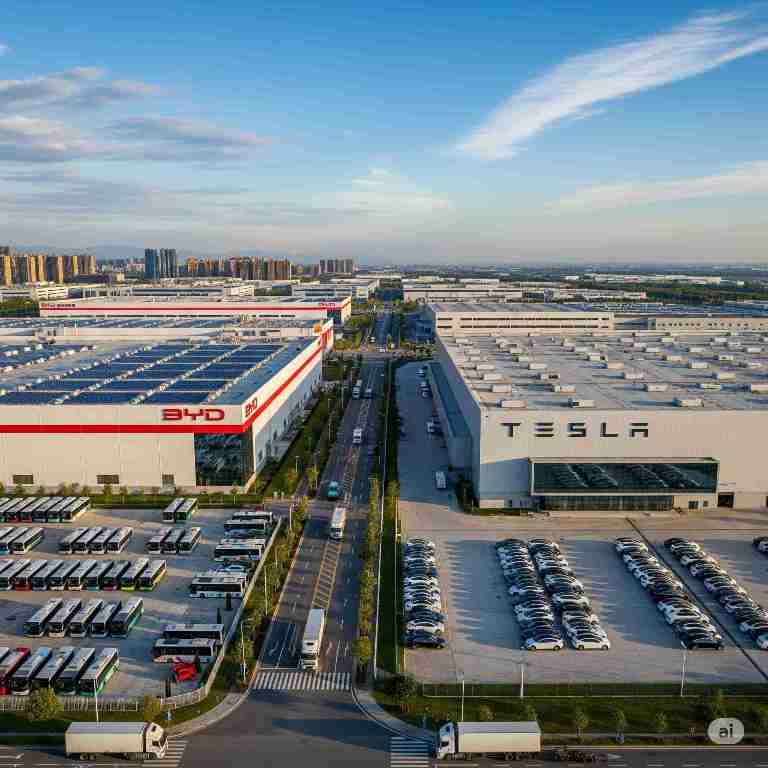After a long wait of many years, Tesla cars have finally arrived in India on 16th July 2025. Fortunately, this time, a Tesla Experience Center (official showroom) has been opened in Mumbai, allowing buyers to experience Tesla cars more closely.
Fortunately, a Tesla Experience Center has been opened in Mumbai, which means this time, Elon is serious about bringing Tesla cars to India, unlike in 2016. We will discuss the 2016 incident later.
India is a rapidly emerging market for electric vehicles globally. The number of potential buyers is growing significantly year after year. At present, many foreign companies are investing and launching EV cars in India, including China. Let’s discuss the Chinese threat to the Indian EV market.

How China is a threat to the Indian EV market
Currently, fewer Chinese EV car brands, such as MG Motors and BYD, are selling EVs in India. However, several Chinese EV makers are exploring or partnering with Indian brands to enter India’s huge EV market.
- China has the potential to erode India’s local EV manufacturers. The EV makers can offer products at a competitive price with a higher build quality. And we all know that India is a very price-sensitive market. Who wouldn’t like high-tech, quality, and cheaper products? Just as Chinese players did with the smartphone industry.
- It’s true that presently, China has the world’s most robust facility, supply chain, and ecosystem to develop advanced Electric vehicles. Years of manufacturing skills and Research and development are paying off.
- In EV manufacturing, one key component is the battery. You won’t believe that the Chinese companies have the world’s best battery technology. Not only do the companies possess advanced battery technology, but they are also the world’s largest battery manufacturers. Most EV makers across the globe import batteries directly from China, including indian electric vehicle makers.
- India’s total electric vehicle market is dependent upon China. Even several Raw materials and other crucial components are coming from China for the local EV manufacturing. Recently, due to some geopolitical issues, China has banned or limited the export of “rare earth metals.” The export ban has trembled the world’s most manufacturing industries. And the “rare earth metals” play a vital role in electric vehicle production.
- Since China’s R&D and patent reserves in EVs surpass those of many countries, especially India. Therefore, it will take decades of research to get to where China is today. Moreover, starting local R&D and developing home-grown technology for EVs would take a considerable amount of time and burn billions of dollars, making it more viable and cost-effective to import technology from China.
- China can easily control all the leverage (supply chain, technology, materials, etc.) it has to give benefits to Chinese-owned EV makers, thereby destroying or controlling other EV companies worldwide. I wish I could deny it, but India’s ambition to become a more EV nation is based on China’s EV spare parts, if not Chinese EV products.
Should Foreign Companies be given limited access?
In today’s world, it would not be healthy to restrict your country’s market. Many foreign car companies have been working well in India for a long time. However, diversity is necessary for fair trade. Allowing any country (China) to take advantage of our weakness will have grave consequences in the long run.
Moreover, the Indian Government’s current stance on EV manufacturing is appreciable. Forcing companies to localize the product and set up a manufacturing plant. Apart from this, importing EVs is restrictive but open with conditions. The Government’s goal is to create an ecosystem of electric vehicle manufacturing in the country. Once the ecosystem has been achieved, further processes will be easier. This is how China is enjoying a monopoly on certain things by creating an ecosystem.
Is Tesla Serious this time?
In 2016, Tesla invited Indian consumers to pre-order the Tesla Model 3. The pre-booking amount was $1000 deposit. After years of waiting, no car has arrived in India till now.
The Indian Government levies a 70-100% import duty on any imported car, making the price of the car double its original cost. Probably, taxes and duties were the reasons for Elon Musk holding back.
In July 2025
Tesla has opened a Tesla Experience Center (official showroom) in Mumbai. And More showrooms are in the pipeline in Cities like Delhi and Gurugram. Apart from this, Supercharger installations are also in the process of development in Mumbai and Delhi.
The Tesla India website is live, and anyone can order a Tesla Model Y from the website. The delivery will start from Q3, 2025, and the priority delivery cities would be Mumbai, Pune, Delhi, and Gurugram. Currently, only one Tesla car, “Model Y”, is available to purchase.
Despite the delays, Tesla cars are still hit with 70-100% import duties, as the Model Y would be imported probably from China as a CBU (complete built unit).

Real fear is “China”
What we are seeing in China today is the result of 30-40 years of hard work by the Chinese people. For any nation to achieve this big, it will take time. It’s not a one-year or two-year job. The Indian government has already identified the “China dependency” problem and is working towards becoming a self-reliant nation.
China is currently enjoying a trade surplus with India, meaning India’s exports to China stand at $14.25 billion, while India’s imports from China stand at $113.46 billion. Overall, India has a trade deficit of $99.2 billion with China, which is a huge number. And this is for the financial year 2024-25. The trade deficit in 2023-24 was $85.08 billion. Every year, this trade deficit is increasing rapidly.
